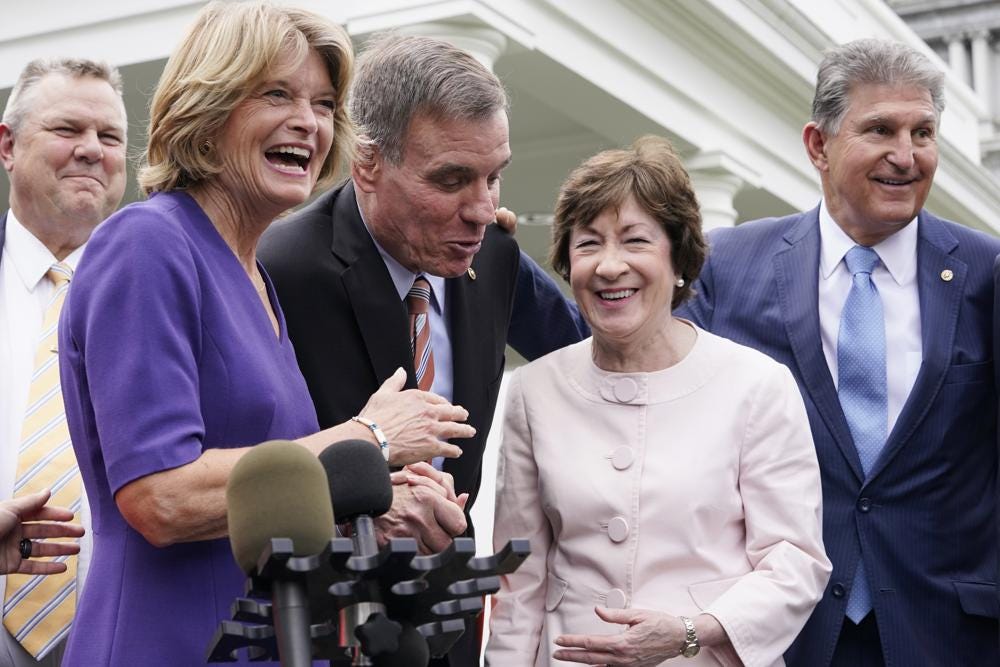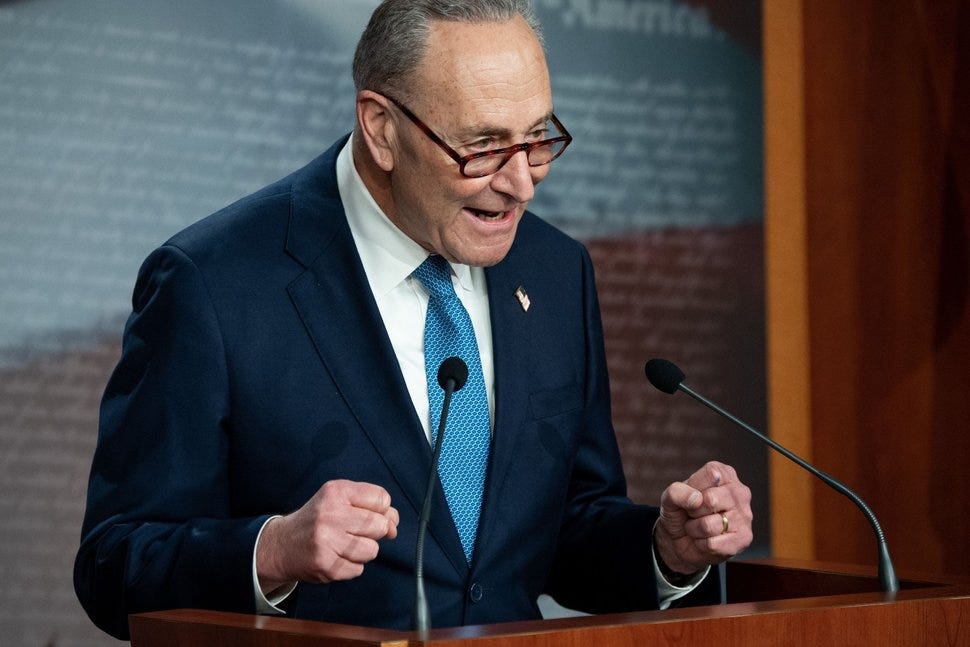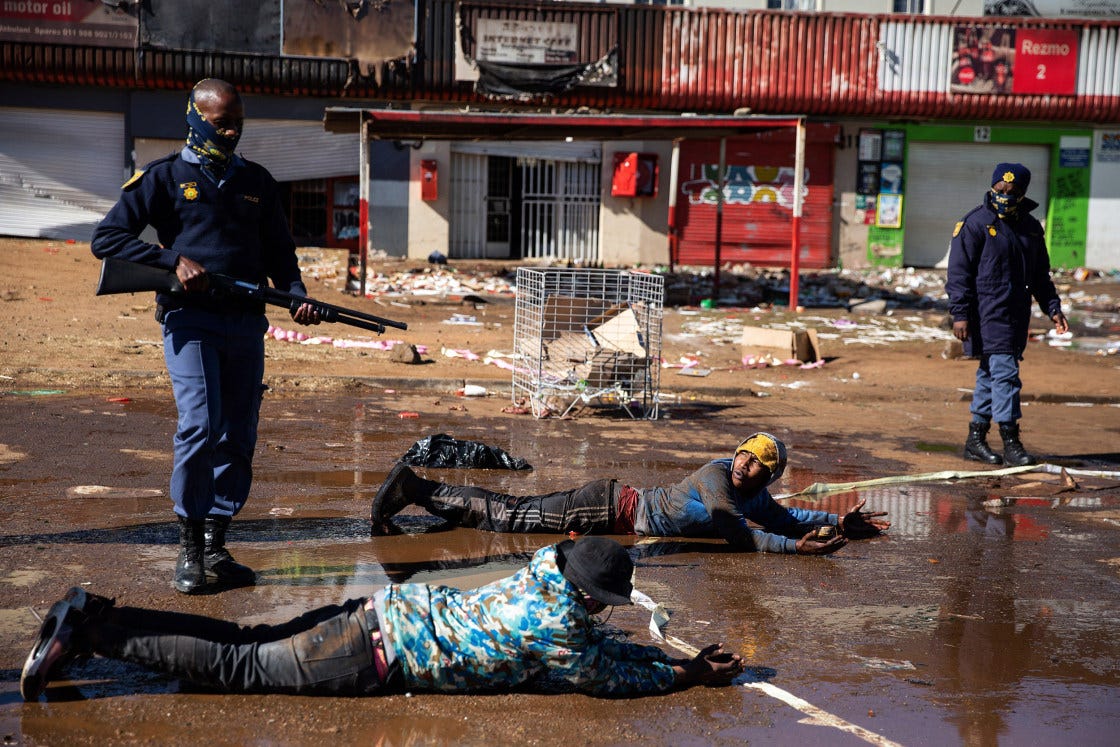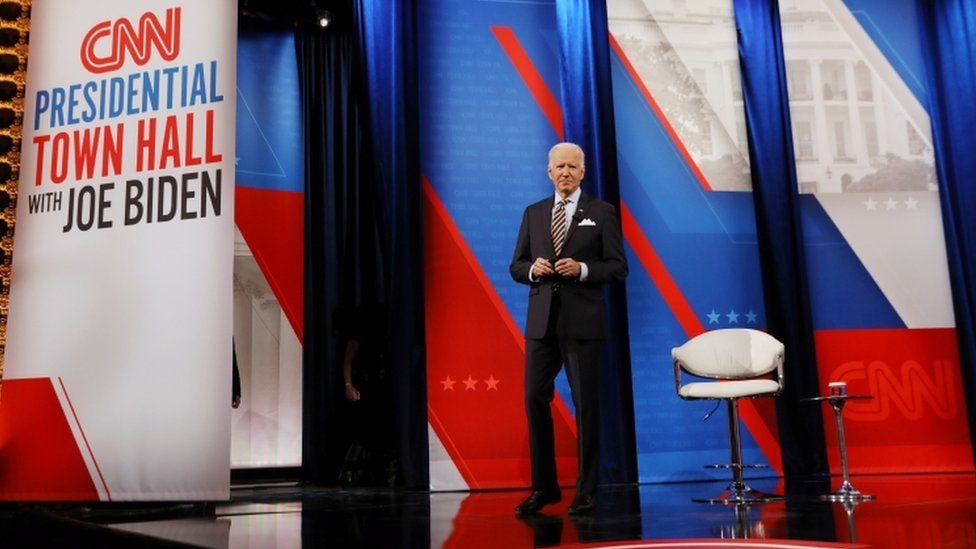Wake Up To Politics - July 21, 2021
Wake Up To Politics: Infrastructure package faces first Senate vote
Good morning! It’s Wednesday, July 22, 2021. Election Day 2022 is 475 days away. Election Day 2024 is 1,203 days away.
Infrastructure package likely to stumble in first Senate vote
Remember when a smiling group of senators went to the White House last month to announce they had forged a bipartisan agreement on infrastructure?
“We have a deal,” President Joe Biden proudly told reporters at the time. “This reminds me of the days when used to get an awful lot done up in the United States Congress,” he added, boasting that a new era of bipartisanship was beginning.
“It sends an important message to the world as well that America can function, can get things done,” Sen. Susan Collins (R-ME) chimed in.
But there aren’t quite so many smiles now. Four weeks after that cross-party “kumbaya” moment, the 10 senators – five Democrats and five Republicans — who said they had agreed to the outline of a bipartisan infrastructure package have yet to turn their “framework” into actual legislation.
The legislative drafting process has hit quite a few snags, with differences emerging on more issues than they let on at the time. The main hurdle has been agreeing to pay for the package, which is slated to invest $579 billion in new spending on over 10 years in the nation’s “physical infrastructure.”

When they ventured over to the White House in June, the negotiators had agreed to a mix of “pay-fors” that included repurposing used Covid relief funds and raising money through public-private partnerships.
Another key financing source was a plan to invest $40 trillion in beefing up enforcement at the Internal Revenue Service (IRS) in order to close the “tax gap” — collecting taxes that are owed but not paid. Lawmakers projected that the enforcement efforts would net about $100 billion that could go towards paying for the infrastructure plan.
Republican negotiators originally agreed to the IRS enforcement plan, but after pressure from others in their caucus — as well as outside activists, such as Americans for Tax Reform president Grover Norquist — they told their Democratic counterparts that another “pay-for” would have to be found to make up that $100 billion.
As negotiators struggled to agree on an alternative funding mechanism, Senate Majority Leader Chuck Schumer (D-NY) attempted to move things along by scheduling a procedural vote on the package for today.
That’s right: Schumer scheduled a vote on a bill that hasn’t yet been written (or, just as importantly, been scored by the Congressional Budget Office to see how much the measure would add to the deficit).
Instead, today’s vote will technically be on advancing another piece of legislation (a House-passed infrastructure bill), with the idea that the bill will be amended in full with the text of the bipartisan agreemnt whenever it is drafted.

This wouldn’t be the first time that’s been done in the Senate — in recent months, Schumer has successfully used the same tactic on bipartisan bills to counter China and address anti-Asian hate crimes — but this time, Republicans have signaled they don’t plan to go along.
“How can I vote for cloture when the bill isn’t written?” Sen. Bill Cassidy (R-LA), one of the five Republican negotiators, asked on “Fox News Sunday” this weekend.
“Unless you want program failure, unless Sen. Schumer doesn’t want this to happen, you need a little bit more time to get it right,” Cassidy added. “It can absolutely happen, but you need the pay-fors.”
Cassidy’s fellow Republican negotiators are expected to oppose the cloture vote as well, meaning the package has effectively no chance of cobbling together the 10 Republican backers it would need to reach the 60-vote threshold and advance.
That doesn’t mean this is the end of the road, however. The talks will continue, and some of the lawmakers involved have expressed hope that an updated agreement could come as soon as today.
That would give time for senators and their aides to write the bill over the weekend, and possibly hold another cloture vote on Monday.
“We’re getting close, gang,” Sen. Joe Manchin (D-WV), another one of the negotiators, said on Tuesday. “We’re not that far apart.” But as today’s test vote is likely to show, they’re not there yet.
The Rundown
More stories driving the news this morning.
Covid at the Capitol: “As Covid infections have crept back onto the Hill, they’ve shattered the sense of calm that had just begun to settle across the complex after the deadly pandemic and insurrection. After a weekslong trudge toward normalcy, fears are now spiking over the highly contagious Delta variant, which the Capitol physician confirmed Tuesday has been reported in Capitol office buildings.” (Politico)
The latest round of Covid fears on Capitol Hill emerged after six of the Texas Democrats who fled to Washington, D.C., to block a GOP voting bill tested positive for the virus. A White House official and an aide to House Speaker Nancy Pelosi (D-CA) have also tested positive after coming into contact with the Texans.
Rep. Vern Buchanan (R-FL) has also contracted the virus and the White House has acknowledged there are other infections in their midst.
With the infectious Delta variant leading to a spike of Covid cases at the Capitol — and around the country — some top conservatives are shifting their message on vaccinations. House Minority Whip Steve Scalise (R-LA) announced on Tuesday that he had been vaccinated, after delaying for months, while Sean Hannity and other Fox News hosts urged their viewers to get the shot.
Click the image to watch Sean Hannity’s appeal to his viewers to get vaccinated.
Another Trump ally indicted: “Thomas J. Barrack Jr., a close friend of former President Donald J. Trump’s and one of his top 2016 campaign fund-raisers, was arrested in California on Tuesday on federal charges of failing to register as a foreign lobbyist, obstruction of justice and lying to investigators.” (New York Times)
Biden taps a leading Big Tech critic: “President Joe Biden plans to nominate Jonathan Kanter as head of the Justice Department’s antitrust division, the White House said Tuesday, the latest sign that the administration is preparing a broad crackdown on large technology companies.” (Bloomberg)
Policy Roundup: Global
On Wednesdays, Wake Up To Politics contributor Miles Hession offers a roundup on the latest global news to know.
A unity government has emerged as the chosen path forward for Haitian politicians following weeks of foreign pressure. The assassination of President Jovenel Moïse two weeks ago left a power vacuum in the already politically fractious nation. Moïse had consistently undermined democratic institutions during his tenure, and his assassination occurred shortly after the announcement of a new prime minister, Ariel Henry, leading to a power struggle between the current and prospective prime ministers with very few senior government officials left to weigh in.
Initially, foreign powers that often influence and pressure Haiti, known as the “Core Group”, backed former Prime Minister Claude Joseph, who placed the country under martial law after the assassination. These powers, however, pivoted towards supporting a unity government led by Henry until elections could be held, a plan promptly adopted by Haitian politicians including Joseph, who resigned on Monday. The rapidly changing leadership has struck Haiti at a time of extreme instability as the Caribbean nation faces an uptick in gang violence and kidnappings, rising poverty, and a slow pandemic response.

Deadly floods have devastated much of Western Europe, leading to renewed criticism of German climate policy in the run-up to the German federal elections. Levels of flooding not seen in Western Europe for 1,000 years have claimed the lives of 205 people, with the death count continuing to rise and hundreds still missing. The floods were a shock to many, especially in hard-hit Germany, as the country’s sophisticated flood warning system failed in many cases to warn residents of rapidly rising water levels.
While the flooding has remained above the political fray for now, there is speculation that the disaster may change the political landscape prior to Germany’s September elections, when voters will choose a successor to Chancellor Angela Merkel.
An “uneasy” calm was established in South Africa after troops were deployed in response to deadly riots that the government says were pre-planned. Riots broke out following the jailing of former president Jacob Zuma over corruption charges, leading to looting and deaths in the country’s two most populous provinces. As the death toll rose to 212, President Cyril Ramaphosa and his government began pointing the blame at specific instigators for the conflict.
Ramaphosa claimed that these riots were a concerted effort to hurt the economy and bring about a regime change. Other analysts pointed to the extreme poverty in the country as the reason why so many took to the streets to loot and riot. While the violence has ceased, the prospect for future instability is still high as railroad lines remain severed and those already experiencing extreme poverty risk further exacerbation.
More global headlines, via Miles:
Prime Minister Boris Johnson of the United Kingdom cancelled his planned “Freedom Day” speech in response to growing controversy over an almost complete relaxation of covid restrictions.
"Leftist political outsider" Pedro Castillo has narrowly won the presidential election in Peru, promising both unity and sweeping change.
The interim prime minister of Lebanon, Saad Hariri, resigned his post, leaving the country without leadership while grappling with extreme instability
Reports of child soldiers have emerged during a rebel resurgence in Tigray, Ethiopia, as refugees fleeing the conflict enter neighboring countries.
Rare protests have broken out throughout Cuba as citizens express frustration with the government’s economic and public health response to the pandemic.
Daybook
What’s happening in Washington today. (All times Eastern)
Executive Branch
→ President Joe Biden will receive his daily intelligence briefing at 10:30 a.m. At 2:25 p.m., he will depart for Cincinnati, Ohio, where he will arrive at 4:10 p.m. At 5:40 p.m., he will deliver remarks on how the infrastructure packages would impact union jobs at a union training center in Cincinnati. At 8 p.m., he will participate in a CNN town hall at Mount St. Joseph University. At 10 p.m., he will fly back to Washington, D.C., returning back at the White House at 11:35 p.m.
According to CNN, the town hall — to be moderated by host Don Lemon — will “focus on a wide range of issues facing the nation, ranging from Covid-19 to the economy.” The network noted that the event is taking place in the hometown of Sen. Rob Portman (R-OH), the chief Republican negotiator in the bipartisan infrastructure talks.
→ Vice President Kamala Harris will meet with poll workers and other election officials “to hear directly from them about their experiences helping voters cast their ballots and have their ballots counted” at 2:45 p.m., as part of her role leading the administration’s voting rights efforts.
→ First Lady Jill Biden will travel to Anchorage, Alaska, on the way to Tokyo, Japan, where she will attend the Olympic opening ceremonies on Friday. At 4:45 p.m., she will arrive in Anchorage. At 5:45 p.m., she will visit Alaska Native Medical Center to “emphasize the need for access to health care in rural areas and encourage Alaskans to get vaccinated.” At 7:30 p.m., she will depart Alaska for Tokyo.
→ White House Press Secretary Jen Psaki will hold a press gaggle aboard Air Force One during the flight to Cincinnati.
Legislative Branch
→ The Senate will convene at 10:30 a.m. Following Leader remarks, the chamber will resume consideration of a pair of Biden nominees. At 11:20 a.m., the chamber will vote to confirm Jennifer Abruzzo to be General Counsel of the National Labor Relations Board, followed by a cloture vote to advance the nomination of Bonnie Jenkins to be Under Secretary for Arms Control and International Security.
At 2:30 p.m., the Senate will vote to confirm Jenkins, followed by a procedural vote on H.R. 3684, which is being used as a vehicle for the as-yet-unwritten bipartisan infrastructure package.
→ The House will convene at 10 a.m. for “morning hour,” when members are able to deliver brief speeches on topics of their choosing. At 12 p.m., the chamber will move to legislative business. The House will hold an hour of debate on H.R. 2467, the PFAS Action Act, which would require the EPA to designate per- and polyfluoroalkyl substances (PFAS) as hazardous. Known as “forever chemicals,” the substances are used in many nonstick and waterproof consumer goods.
The chamber will debate the bill before voting on various amendments and then the measure itself.
Judicial Branch
→ The Supreme Court is on recess until October.
Thanks for waking up to politics! If you enjoy reading this newsletter, I’d be so grateful if you’d consider donating to help support me and my work. If you want to show off your support for Wake Up To Politics, you can also buy some merchandise.
Also: don’t forget to tell your friends and family to sign up for the newsletter using your unique referral link. And if you have any questions or comments, feel free to email me at any time.






